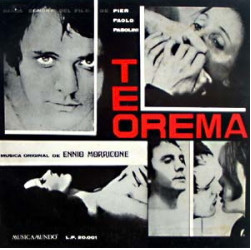主页--->m-comment-000--->mb-comment-006-60
|
电脑版 |
|||||||||||||||||||||||||||||||||||||||||||||
布罗克斯顿评说莫里康内 MB-006-60 |
||||||||||||||||||||||||||||||||||||||||||||||
FA6822 Teorema
/ Theorem / 定理 |
||||||||||||||||||||||||||||||||||||||||||||||
作者 乔纳森·布罗克斯顿 (Jonathan Broxton) |
||||||||||||||||||||||||||||||||||||||||||||||
ENNIO MORRICONE 评论,第6部分 006-60 |
||||||||||||||||||||||||||||||||||||||||||||||
 |
||||||||||||||||||||||||||||||||||||||||||||||
定理 (1968) 《定理》是一部不寻常的意大利心理剧,由皮埃尔·保罗·帕索里尼编剧和导演,特伦斯·斯坦普、劳拉·贝蒂和西尔瓦娜·曼加诺主演。斯坦普饰演一个只被称为“访客”的神秘人物,出现在一个典型的意大利上流社会家庭的生活中,通过同情、安慰和性表达的结合,一一剥离他们所有的疑虑、恐惧和压抑; 最终,来访者一到就消失了,让家人自己接受他们新发现的自由和解放。多年来,电影学者对这部电影进行了广泛的研究,其中许多人对帕索里尼的意图和意义、访客的本质以及电影的神性、性和消费主义的整体主题得出了截然不同的结论。 在乐谱的大部分时间里,莫里康内都参与了他最具挑战性的古典配乐,为弦乐、木管乐器、I Cantori Moderni di Alessandroni 的独特声音、大键琴以及无数不同的打击乐以复杂、无调、迷失方向的方式创作音乐。开场的“Teorema”和随后的“Frammenti”都非常具有挑战性,通常这种事情会让我反感,但莫里康内创造的疏离音景实际上非常迷人,尤其是考虑到与乐谱其余部分的音调对立。 “Fruscio de Foglie Verdi (Cantato)”和“Beat N. 3”都具有感染力十足的乐观欧洲流行音乐美学、约翰·巴里(John Barry)式的性感弦乐、摇滚吉他和活泼的打击乐。“Fruscio de Foglie Verdi”中的人声由Trio Junior以丝般流畅的方式演绎,实际上,它们与前两个提示截然不同。他们几乎来自另一个世界。在“Fruscio de Foglie Verdi”的背景中听到呼啸的风效果也很有趣,这进一步说明了莫里康内如何经常使用音乐混凝土风格的真实世界声音来为他的乐谱添加不同的维度。同样,带有西班牙语色彩的“L'Ultima Corrida”将更多的欧洲流行音乐节拍与墨西哥流浪乐队小号、电吉他和响板融合在一起,创造出一种迷人而有趣的风格融合。 Theorem 的配乐完全是精神分裂症,但非常有趣,如果你能理解一个将极具挑战性的 20 世纪古典配乐与轻流行节拍和歌曲相结合的乐谱,那么这可能值得一试。多年来,该乐谱已多次发布;由于其运行时间短,它通常与其他乐谱组合在一起,作为 2 或 3 对 1 的汇编。其他专辑将其作为较长的独立发行的一部分,通常还包括莫扎特的几首经典作品。我在这里回顾的版本是日本唱片公司King Records在1994年发行的版本,其中包括莫扎特的选段。瑞典唱片公司 Fin de Siècle Media 于 2008 年发行了一张专辑,将 Theoreom 的相同曲目与 1969 年电影 La Stagione dei Sensi 和 Vergogna Schifosi 的配乐相结合。 曲目列表: 1. Teorema (4:15), 2.弗拉门蒂 (2:30), 3.Fruscio de Foglie Verdi (康塔托) (2:25), 4.L'Ultima Corrida (2:40), 5.击败 N. 3 (2:47), 6.安魂曲 (莫扎特) (7:00), 7.凯里·埃莱森 (莫扎特) (2:40), 8.Rex Tremendae Majestatis (莫扎特) (2:56), 9.Confutatis Maledictis (莫扎特) (2:45), 10.La Rimosa Quies Ill (莫扎特) (3:50), 11.Agnus Dei (莫扎特) (3:40).King Records KICP-39,37分28秒。 |
||||||||||||||||||||||||||||||||||||||||||||||
2020.9.19 |
||||||||||||||||||||||||||||||||||||||||||||||
|
| ||||||||||||||||||||||||||||||||||||||||||||||
以下是原文
| ||||||||||||||||||||||||||||||||||||||||||||||
ENNIO MORRICONE REVIEWS, Part 6-60 |
||||||||||||||||||||||||||||||||||||||||||||||
THEOREM (1968) Theorem is an unusual Italian psychological drama written and directed by Pier Paolo Pasolini, starring Terence Stamp, Laura Betti, and Silvana Mangano. Stamp plays a mysterious figure known only as “The Visitor” who appears in the lives of a typical upper-class Italian family, and one by one strips them of all their doubts, fears, and inhibitions through a combination of compassion, comfort, and sexual expression; eventually, the Visitor disappears as quickly as he arrived, leaving the family to come to terms with their new-found freedom and liberation on their own. The film has been studied extensively by film scholars over the years, many of whom have come to vastly different conclusions about Pasolini’s intent and meaning, the nature of the Visitor, and the film’s overall themes of divinity, sexuality, and consumerism. Large parts of the score sees Morricone engaging in some of his most challenging classical scoring, writing music for layers of strings, woodwinds, the unique voices of I Cantori Moderni di Alessandroni, harpsichords, and numerous different percussion sounds in complicated, atonal, disorienting ways. Both the opening “Teorema” and the subsequent “Frammenti” are really challenging, and usually this sort of thing would turn me off, but the alienating soundscape Morricone creates is actually quite fascinating, especially considering how much is stands in tonal opposition to the rest of the score. Both “Fruscio de Foglie Verdi (Cantato)” and “Beat N. 3” have an infectiously upbeat Europop aesthetic, John Barry-esque sultry strings, rock guitars, and lively percussion. The vocals in “Fruscio de Foglie Verdi” are performed with silky smoothness by Trio Junior and, really, they couldn’t be more different from the first two cues. They are almost from another world. It’s also fun hearing the whooshing wind effects in the background of “Fruscio de Foglie Verdi,” further illustrating how Morricone often worked with musique concrete-style real world sounds to add different dimensions to his scores. Similarly, the Spanish-inflected “L’Ultima Corrida” blends more Euro-pop beats with mariachi trumpets, electric guitars, and castanets, creating a fascinating and entertaining blend of styles. The score for Theorem is completely schizophrenic, but superbly entertaining, and if you can get your head around a score which is a combination of super-challenging 20th century classical scoring with light pop beats and songs, then this might beone worth checking out. The score has been released many times over the years; due to its short running time it is usually combined with other scores as a 2-or-3-for-1 compilation. Other albums include it as part of a longer standalone release that also usually includes several classical pieces by Mozart. The version I have reviewed here is the one released by Japanese label King Records in 1994, which includes the Mozart excerpts. There is also a release from Swedish label Fin de Siècle Media from 2008, which combines the same tracks from Theoreom with music from the scores for the 1969 films La Stagione dei Sensi and Vergogna Schifosi. Track Listing: 1. Teorema (4:15), 2. Frammenti (2:30), 3. Fruscio de Foglie Verdi (Cantato) (2:25), 4. L’Ultima Corrida (2:40), 5. Beat N. 3 (2:47), 6. Requiem (Mozart) (7:00), 7. Kyrie Eleison (Mozart) (2:40), 8. Rex Tremendae Majestatis (Mozart) (2:56), 9. Confutatis Maledictis (Mozart) (2:45), 10. La Rimosa Quies Ill (Mozart) (3:50), 11. Agnus Dei (Mozart) (3:40). King Records KICP-39, 37 minutes 28 seconds.
|
||||||||||||||||||||||||||||||||||||||||||||||
Sep 19, 2020 |
||||||||||||||||||||||||||||||||||||||||||||||
在线音乐试听 |
||||||||||||||||||||||||||||||||||||||||||||||
|
||||||||||||||||||||||||||||||||||||||||||||||
 |
||||||||||||||||||||||||||||||||||||||||||||||
Jon 是一位电影音乐评论家和记者,自 1997 年以来一直担任全球最受欢迎的英语电影音乐网站之一 Movie Music UK 的编辑和首席评论员,并且是国际电影音乐评论家协会 (IFMCA) 的主席。在过去的 20多 年中,Jon 撰写了 3,000 多篇评论和文章,并进行了多次作曲家采访。在杂志刊物方面,乔恩曾为《电影配乐月刊》、《原声带杂志》和《电影音乐》等出版物撰写评论和文章,并为普罗米修斯唱片公司的两张经典 Basil Poledouris 配乐专辑《Amanda》和《Flyers / Fire on the Mountain》撰写了衬垫注释。他还为汤姆·胡佛 (Tom Hoover) 于 2011 年出版的《Soundtrack Nation: Interviews with Today's Top Professionals in Film, Videogame, and Television Scorering》一书撰写了一章。在1990年代后期,乔恩是伦敦皇家爱乐乐团的电影音乐顾问,并与他们合作拍摄了约翰·德布尼(John Debney)的音乐电影《相对价值》(Relative Values)和奥利弗·海斯(Oliver Heise)的音乐《佛陀的指环》(The Ring of the Buddha),以及与兰迪·纽曼(Randy Newman)合作的一系列音乐会。2012年,乔恩在波兰克拉科夫举行的第五届年度电影音乐节上担任“电影节学院”主席。他是作曲家和作词家协会的成员,该协会是作曲家、作词家和词曲作者从事电影、电视和多媒体工作的首要非营利组织。 |
||||||||||||||||||||||||||||||||||||||||||||||
2023.12.1 |
||||||||||||||||||||||||||||||||||||||||||||||
2023 手机版 |
||||||||||||||||||||||||||||||||||||||||||||||
|
||||||||||||||||||||||||||||||||||||||||||||||













